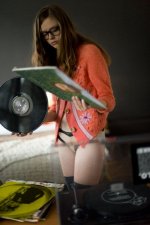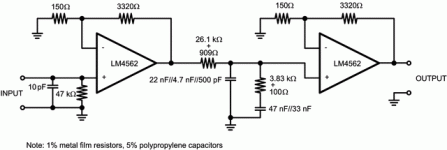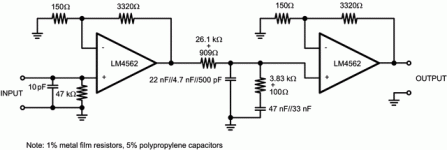Does your CDP have a stylus wiggling in a groove?
I don't think mine has!
Exactly. The signal processing technique doesn't care what A and B are. In both cases of signals from CD and record, A+B compared to A-B only reveals degree of correlation between A and B.
Look at mono vinyl recording of 1kHz sine. All information is effectively laterally encoded. Filter out the 1kHz and its harmonics and then take a close look at the resulting waves for A and B. Look at X/Y plots; nothing is stable over time. Applying A+B or A-B tells nothing about lateral and vertical contributions.
Last edited:
........& so on, and that some of this is vertical with respect to the stylus, and therefore appears out of phase and cannot be localised by the ears. He says it therefore is interpreted as 'surround sound' ambience on the recording.
I know a fellow who produces CD's from old stuff, transfers mono records or tapes in stereo for the same reasons. In case of the tapes a slight misalignment of the azimuth on a stereo head give a similar sensation.
I think I found the answer...
View attachment 535091
Notice she is holding the record the correct way..... The Record.....She is holding it correctly.....the record......... The Round Black Thing!
Dan.
Yes, the record.
I traded my Denon DP2000 wit a SME arm fitted with a Shure V15 for a wide angle zoom. The person is now 40 and his friend coming over to him and looking at the thing , asking "and you can play music on this?" 😀
I'm obsolete.
Update on The Devinyliser.
The article describing and giving practical build details is finished, and it is with Jan Didden for publication in Linear Audio in April.
My plan to give a talk on its operation at the Audio Engineering Society convention in Paris (4-7 June) has been approved.
Not much progress on the planned PCB- only 3 people have expressed interest and really more would be better. Come on, roll up!
The article describing and giving practical build details is finished, and it is with Jan Didden for publication in Linear Audio in April.
My plan to give a talk on its operation at the Audio Engineering Society convention in Paris (4-7 June) has been approved.
Not much progress on the planned PCB- only 3 people have expressed interest and really more would be better. Come on, roll up!
Is this not just a mono switch in action?If you are happy with a 6dB/oct rolloff of the anti-phase signal then an elegant solution is crossfeed with two caps and a resistor, as described by Renardsen:
Phono Pre-amp Design
It would be easy to implement, but I don't seems to understand it...🙄
Is this not just a mono switch in action?
It would be easy to implement, but I don't seems to understand it...🙄
It's not a mono switch because it only crossfeeds at low, possibly subsonic, frequencies.
My Devinyliser article has just appeared in Linear Audio Vol 11, and it gives a full explanation and a practical circuit.
It's not a mono switch because it only crossfeeds at low, possibly subsonic, frequencies.
My Devinyliser article has just appeared in Linear Audio Vol 11, and it gives a full explanation and a practical circuit.
Could someone help me with a small modification of my RIAA, so I can evaluate this rumple solution?
I guess I will need a common resistor between channels and two capacitors between stages?
My RIAA is the LM4562 two stage with passive EQ in the middle.....
Attachments
Max are you someone who will use this? To me vinyl is an art form. If not buy CD's. We know they are perfect don't we. As someone who malkes the Garrard 501 turntable I don't have a clue why anoyone would do this. It's like having film and wishing it were video. Having done that we did use collour correction. It always looked like film. My favourite is the film blow up. It is super real although with plenty of errors.
A similar device can be had to make headphones send the image to the front. One soon realises it's not enough to make it worthwhile. The headpones are still unpleasent ( hot and clamping ),
My Self. Please consider an excellent amp in the style of H C Lin or link below. I find not having a LTP and adding an output cap something I don't loose sleep over. I have various of your power amp book all over thee house. Read the first time in Texas in the mid day sun. It's a good read with nothing left unsaid. Good English. Me being Autistic I couldn't do that and relate the facts in best order. I suppose I accept 50 % of what you say and reject the rest. The 50 % is without error. Just I can do better. MJE340/350 come to mind although I guess the are 6 times faster than needed.
MJR7-Mk5 Mosfet Power Amplifier
I think it's a combo of dynamic range compression (so less irksome), and the fact that the vinyl will be vibrated by the needles mass just enough to create some very short term reverb. Non consciously perceptable, but you feel it. It gives "body" to the sound. Another form of euphonics.
That'smore like it. Michael Gerzons flutter echo perhaps. Not important what or why. Just mark the thing you hear. Fleatwood Mac Rumours has enhancement like that. Still get a buzz hearing it. The effect works against many things. but used with care makes the voices almost sureal. The inventor made a bad repair of a tube amp and preserved it until his skills increased. Glad he did.
Could someone help me with a small modification of my RIAA, so I can evaluate this rumple solution?
I guess I will need a common resistor between channels and two capacitors between stages?
My RIAA is the LM4562 two stage with passive EQ in the middle.....
I have been wondering about this modification of my RIAA to test the effectiveness of this rumble cancellation.
On the each output I have a 1uF output capacitor (not shown on schematic) and if I interconnect the output side of these via a resistor (1-10k) in series with a switch, I will be able to deactivate the feature.
Will this Work or is there something I have overlooked? 🙂
Attachments
I have been wondering about this modification of my RIAA to test the effectiveness of this rumble cancellation.
On the each output I have a 1uF output capacitor (not shown on schematic) and if I interconnect the output side of these via a resistor (1-10k) in series with a switch, I will be able to deactivate the feature.
Will this Work or is there something I have overlooked? 🙂
Well, now its in test 🙂
I have made a selector, 1: Mono summing from 70Hz, 2:Mono summing from 160Hz and 3: Off.
There seems to be no difference between the 3 positions of the selector soundwise, but on records with much LF-rumble there is a clearly reduction of woofer cone movement. Best in 160Hz setting.
Now I will try to have a mono summing also from 320HZ 🙂
Is this a question that we need to know the answer to?
It seems there is little to be gained by continuing to pursue the subject. This is a discussion which has, after all, being going on upwards of 35 years now.
The fact is people continue to enjoy LP playback in 2016, long after compact disks have ceased to be the default medium for recorded music. Will there be a similar nostalgia-fueled revival of CDs? I sincerely doubt it. In that sense vinyl has already won.
I think we can settle on the more neutral conclusion "LP playback is enjoyable" and consign the more combative "LPs sound better than CDs" to the dustbin of 1980's history. And to be honest I think we can drop the "why" of it, too.
It's a lot of things, I reckon, and it differs from person to person and system to system. To weigh in on the original proposed hypothesis: no, I don't think infrasonic groove noise / rumble plays a large role, though the physicality of the needle/groove/audible noise certainly does. I note that of my LPs, the ones with obvious warp or relatively high surface noise are not more enjoyable to listen to than the cleaner, flatter ones. In fact the opposite is true. This would seem to count against the idea.
I've noticed the lines of the debate shift over the years, from technical arguments like jitter or anti-aliasing in the 1990's, to more cultural/psychological "it forces you to sit down and listen" arguments today. Funnily enough the sonic virtues of LPs cited by the format's supporters remain largely invariant.
Audio reproduction is still 20% magic. Maybe more. Enjoyment is ephemeral. Sometimes it is best not to peek around the curtain.
It seems there is little to be gained by continuing to pursue the subject. This is a discussion which has, after all, being going on upwards of 35 years now.
The fact is people continue to enjoy LP playback in 2016, long after compact disks have ceased to be the default medium for recorded music. Will there be a similar nostalgia-fueled revival of CDs? I sincerely doubt it. In that sense vinyl has already won.
I think we can settle on the more neutral conclusion "LP playback is enjoyable" and consign the more combative "LPs sound better than CDs" to the dustbin of 1980's history. And to be honest I think we can drop the "why" of it, too.
It's a lot of things, I reckon, and it differs from person to person and system to system. To weigh in on the original proposed hypothesis: no, I don't think infrasonic groove noise / rumble plays a large role, though the physicality of the needle/groove/audible noise certainly does. I note that of my LPs, the ones with obvious warp or relatively high surface noise are not more enjoyable to listen to than the cleaner, flatter ones. In fact the opposite is true. This would seem to count against the idea.
I've noticed the lines of the debate shift over the years, from technical arguments like jitter or anti-aliasing in the 1990's, to more cultural/psychological "it forces you to sit down and listen" arguments today. Funnily enough the sonic virtues of LPs cited by the format's supporters remain largely invariant.
Audio reproduction is still 20% magic. Maybe more. Enjoyment is ephemeral. Sometimes it is best not to peek around the curtain.
The basic premise is wrong here
This is nothing but a bunch of engineers bashing vinyl as an imperfect medium and trying to explain how some eccentric people might prefer it
Vinyl had way more information than any cd
Cd cannot get the human voice right
The violin right at all
Most of the top dac makers still use vinyl as the reference
The low level information off a record is highly perishable
It is lost going through one transistor
I suppose you believe the greater sense of space is also an artifact of vinyl
It is not
A high end analogue all tube system can reproduce the entire soundstage with one speaker and the sound of the space of each note
This is nothing but a bunch of engineers bashing vinyl as an imperfect medium and trying to explain how some eccentric people might prefer it
Vinyl had way more information than any cd
Cd cannot get the human voice right
The violin right at all
Most of the top dac makers still use vinyl as the reference
The low level information off a record is highly perishable
It is lost going through one transistor
I suppose you believe the greater sense of space is also an artifact of vinyl
It is not
A high end analogue all tube system can reproduce the entire soundstage with one speaker and the sound of the space of each note
It's mildly funny that people want to do this. It's a bit like improving a motorcyle to be almost a car. Royce Creasey ( spelling ) tried and failed with that. He found as did ELF racing that the standard motor cycle is too short to work as hoped ( it was half a car in the end more or less). BMW took up some of his ideas. I found great value in this thread as for 78's this could be made to work. I use tons of EQ in my applications. I always know the curve I need before trying it. Mostly the maths are easy and can even offer correct phase when in luck. Never be frightened by maths. Usually someone who can help is not far away. There was a little book called teach yourself Calculus I think I had. Actually it was all I ever needed.The teach yourself maths also good. Might be by Abbot. It is about UK O level standard which seems about right for DIY Audio. Mostly the maths needed is age 13 level for someone who would go on to maths at degree level in later life. Maths without application I find impossible. Don't ask me to do statistics.I understand it, I just don't remember how to get going with it. Anything with a subjective zero point I can't mess with if you get my point?
BTW my home brew CD player sounds much like LP and both sound good . It has no filtering except that which Crystal recomend if asking. Only 10% of my CD's are as well produced as my LP's. A Peggy Lee CD can not be matched by many LP's. It's about cynical mass production of CD's to filll the wants of people. It was a con. I have a friend who was at DGG who wrote sleeve notes. Martin Baker, now kids author. He much prefers LP. DDG were No 1 at thinking CD far better with Karajan stating it publically. DDG is a weird sound at times. It's the music that wins over the house style. All the same DGG LP's are masterpices and their CD's mostly not. Talk about falling at the last fence.
I think it's a combo of dynamic range compression (so less irksome), and the fact that the vinyl will be vibrated by the needles mass just enough to create some very short term reverb. Non consciously perceptable, but you feel it. It gives "body" to the sound. Another form of euphonics.
YES. It is a musical quality called vibrato. My own turntable at - 79 dB still has verve. That's because the weighting curves hide the truth. It still has tons of vibration as does the LP. Filtering can not remove the hetrodyne of vibrato. Small speakers have bass when they don't. It is the shape the real bass imposses that fools us by a hetrodye effect. I was taught this by a Jesuit in Belgium Tournai to be exact. Thank goodness I speak French as he wasn't good in English. He used a pipe organ to prove it. The Church St Lazare in Chee de Lille. He was 80 in 1984 so won't be with us now. He built the organ using 8 bit digital controls like fly by wire. Pipes were plastic as for gas. A first class machine at 1/3 the cost of rebuilding what they had. It has a 26 foot pipe so tons of tone coulour. Timing his feet produced mid range openess. An organist has to have this ability if to be an expert. Each organ is totally different and needs thought to get the best. The time delays are held in the brain.
- Status
- Not open for further replies.
- Home
- Source & Line
- Analogue Source
- Hypothesis as to why some prefer vinyl: Douglas Self



